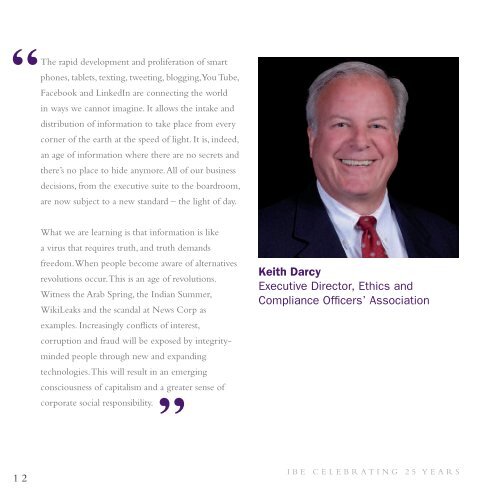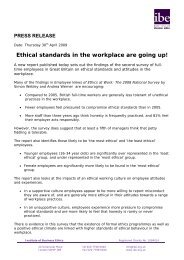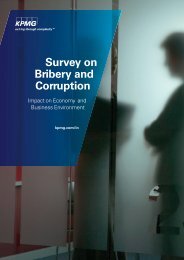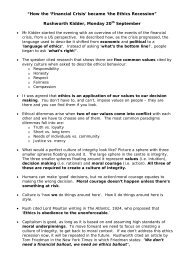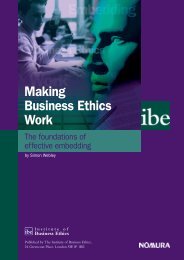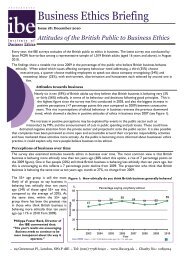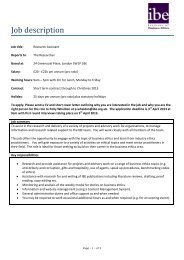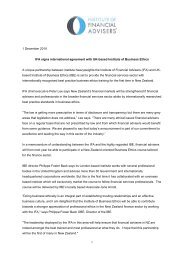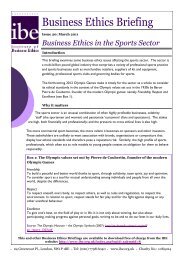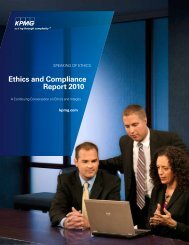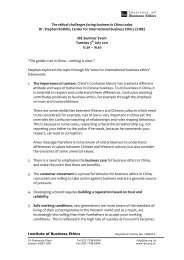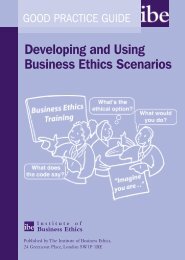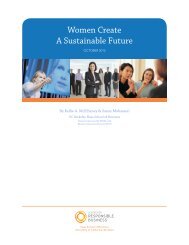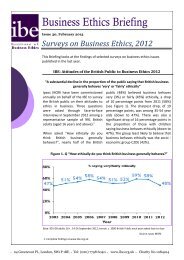here - Institute of Business Ethics
here - Institute of Business Ethics
here - Institute of Business Ethics
Create successful ePaper yourself
Turn your PDF publications into a flip-book with our unique Google optimized e-Paper software.
“ “<br />
The rapid development and proliferation <strong>of</strong> smart<br />
phones, tablets, texting, tweeting, blogging, You Tube,<br />
Facebook and LinkedIn are connecting the world<br />
in ways we cannot imagine. It allows the intake and<br />
distribution <strong>of</strong> information to take place from every<br />
corner <strong>of</strong> the earth at the speed <strong>of</strong> light. It is, indeed,<br />
an age <strong>of</strong> information w<strong>here</strong> t<strong>here</strong> are no secrets and<br />
t<strong>here</strong>’s no place to hide anymore. All <strong>of</strong> our business<br />
decisions, from the executive suite to the boardroom,<br />
are now subject to a new standard – the light <strong>of</strong> day.<br />
What we are learning is that information is like<br />
a virus that requires truth, and truth demands<br />
freedom. When people become aware <strong>of</strong> alternatives<br />
revolutions occur. This is an age <strong>of</strong> revolutions.<br />
Witness the Arab Spring, the Indian Summer,<br />
WikiLeaks and the scandal at News Corp as<br />
examples. Increasingly conflicts <strong>of</strong> interest,<br />
corruption and fraud will be exposed by integrityminded<br />
people through new and expanding<br />
technologies. This will result in an emerging<br />
consciousness <strong>of</strong> capitalism and a greater sense <strong>of</strong><br />
corporate social responsibility.<br />
“<br />
Keith Darcy<br />
Executive Director, <strong>Ethics</strong> and<br />
Compliance Officers’ Association<br />
Of the many challenges facing business ethicists in<br />
the next 25 years, we must get better at asking the<br />
right questions. We have to expand our remits to<br />
cover not only individual integrity questions but also<br />
institutional integrity challenges.<br />
What does this mean? We are good at applying<br />
individual facts in complex situations to rules. Now<br />
let’s engage on those broader, more intractable – yet<br />
simpler to state – questions. How do resources<br />
come to our organisations? What do we make and<br />
sell? How do we make it? To whom do we sell it?<br />
And what do they do with it once we have sold it?<br />
Who are the business partners – up and down our<br />
supply chains – in whose company our reputations<br />
are judged? How do we know that we are making<br />
a difference in the lives <strong>of</strong> our beneficiaries and<br />
stakeholders? Have we sufficiently minimised the<br />
harm <strong>of</strong> unintended consequences that flow from<br />
even the best intentioned initiative?<br />
Joan Dubinsky<br />
Director <strong>of</strong> <strong>Ethics</strong>, United<br />
Nations<br />
As business ethicists, we cannot answer these<br />
pr<strong>of</strong>ound questions by ourselves. But we can frame<br />
these questions in ways that make them more likely<br />
to be answered. Questions that can be answered<br />
can lead to tangible – and beneficial – action. The<br />
ethical course <strong>of</strong> action for our organisations is to<br />
help repair the world that we live in. Acting ethically<br />
in an imperfect world isn’t a choice. It’s our moral<br />
imperative. And isn’t it better to act ethically than to<br />
preach to the wind.<br />
“<br />
I B E C E L E B R A T I N G 2 5 Y E A R S<br />
I B E C E L E B R A T I N G 2 5 Y E A R S<br />
1 2 1 3


